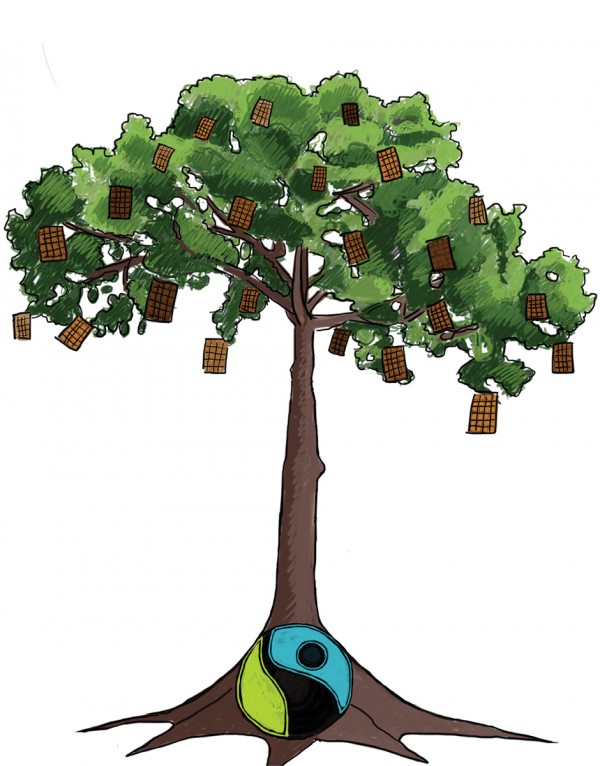Eco-Labels

05 Oct, 2015 | Rafael Bertoli-Mitchell
Health & Science and Social issues
Sowing the seeds of Bolivian fair trade
Amid smells of dust and car engines, the scent of chocolate is unmistakable. Here in the sprawling mess of El Alto stands El Ceibo, a chocolate factory that has been growing, processing and exporting Bolivian cacao beans for over three decades.
As a member of the Fair Trade Platform, El Ceibo forms part of a national initiative that groups eighteen farming associations to meet the needs of small producers in Bolivia. Today, it has more than 1,200 members and generates direct employment for over 100 people. For Hernan Siñani, Production Manager at El Ceibo, the objective of fair trade is clear. ‘We promote the products of farmers who own under three hectares of land,’ he explains. ‘In previous years, if you wanted to produce organically, the costs were too high; consumers were not willing to pay extra.’
After being carefully selected, the beans are fermented and dried on farmers’ plots and at El Ceibo’s facilities in Sapecho, Alto Beni. Regular visits from technical staff ensure that organic farming methods are observed at every stage of production. Despite the saturation of the fair-trade industry in South America, the factory’s processes remain unique. ‘We transport the beans in clean vehicles to avoid contamination, travelling across some of the world’s most dangerous roads,’ explains Mr Siñani. ‘They are then kept in a controlled environment to prolong their lifespan, something that isn’t possible in the humidity and temperature of the region of cultivation.’ Seeing no part of the bean as expendable, the factory dissects each one into shell, liquor, butter, paste, and cacao. All five of these products are certified as organic.
Cooperatives such as the Fair Trade Platform seek to secure more equitable revenues and better living conditions for their members in an attempt to revolutionise the grey market, or informal economy. More than 60% of the working population in Bolivia is involved in this sector; indigenous producers are paid little for their work, and remain excluded from any public initiative. Indeed, a lack of access to markets has kept 82% of rural Bolivians below the poverty line, according to a recent report by the United Nations.
El Ceibo remains, however, a modest piece in a larger puzzle. The rise of fair-trade coffee, clothing, charcoal and even gold in Bolivia marks a determined attempt to use eco-labelling as an indicator of the environmental and social responsibility of companies in an age of conscious consumption.
Yet the effectiveness of eco-labels is increasingly being called into question. On a corporate level, the risk of ‘greenwashing’ (deceptively using marketing to present an environmentally responsible image) is becoming dangerously high. Indeed, the Rainforest Alliance was recently criticised for certifying products that contained only 30% fair-trade ingredients, damaging the credibility of the eco-label. As a result, a number of companies have begun to establish their own certification schemes. Educating producers about the objective of fair trade has been an ongoing challenge for its promoters; El Ceibo’s long-term emphasis on community sustainability goes against many farmers’ cash-in-hand reflexes. On a consumer level, the sheer quantity of labels has diminished their role as an accessible information tool.
For manufacturers such as El Ceibo, cost-efficiency poses the greatest threat. ‘The price of fair-trade cocoa is no more than $4000 per metric ton,’ reveals Mr Siñani, ‘but we pay $4800 with transport costs. It’s not worth it at the moment.’ With strict criteria and fair trade certifications each costing over $9000, it’s easy to see why.
The foreign market has further complicated the situation. ‘85-90% of our products used to be exported, but now the emphasis on the domestic market and internal investment means that only 15% of our products are sold abroad,’ Mr Siñani points out. Increasingly accessible contraband means that working with high-quality raw materials is no longer a requisite for a company’s success. ‘There are synthetic chocolates out there that can be sold very cheaply, and our clients cannot see the difference; for them, it’s just a chocolate.’
The future of fair trade is not as bleak as it may seem, however. The Platform is still young, and has yet to transform its general objectives for fair trade into clear-cut proposals with which to address the government. By learning from the work carried out in neighbouring countries with government agencies dedicated to fair trade, including Brazil and Ecuador, Bolivia’s domestic lobby is gathering pace. Change at the top is needed, and Mr Siñani is confident that this will come. ‘The factory is named after the folkloric Ceibo tree, known for its regenerating qualities. In spite of adversity, we will always come back to life.’








